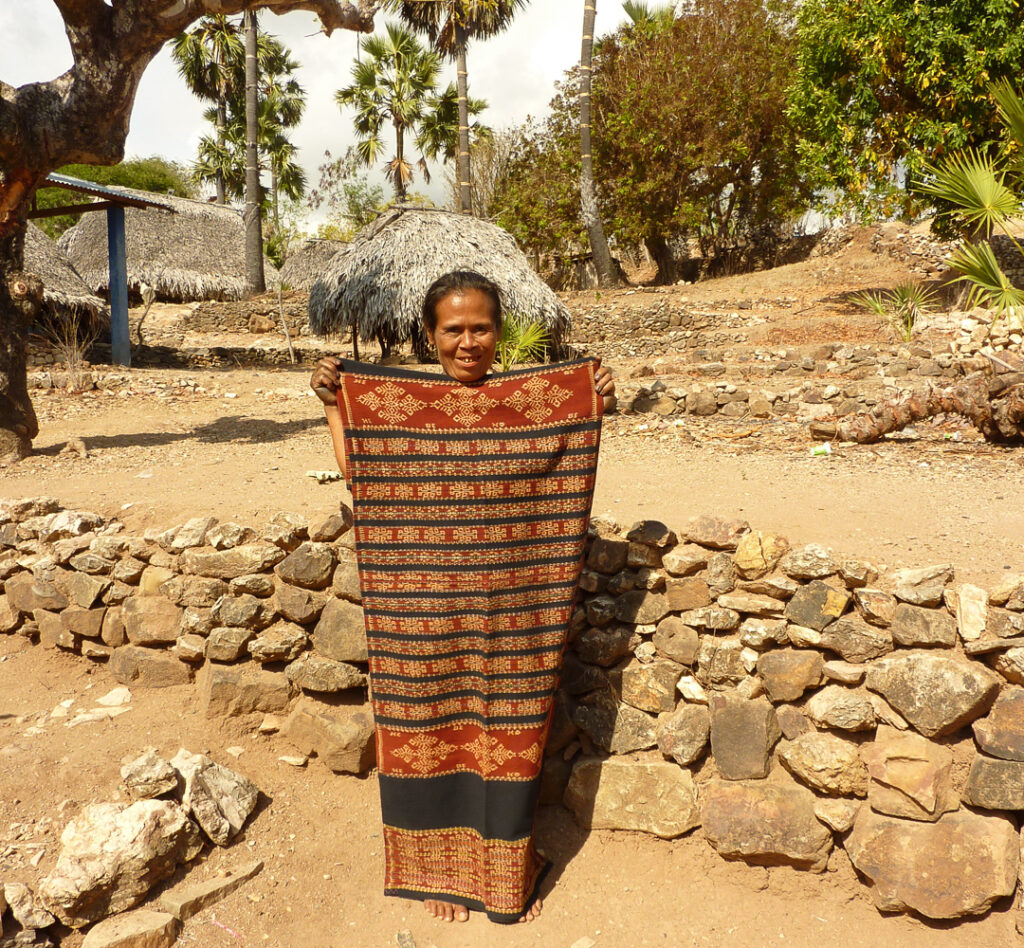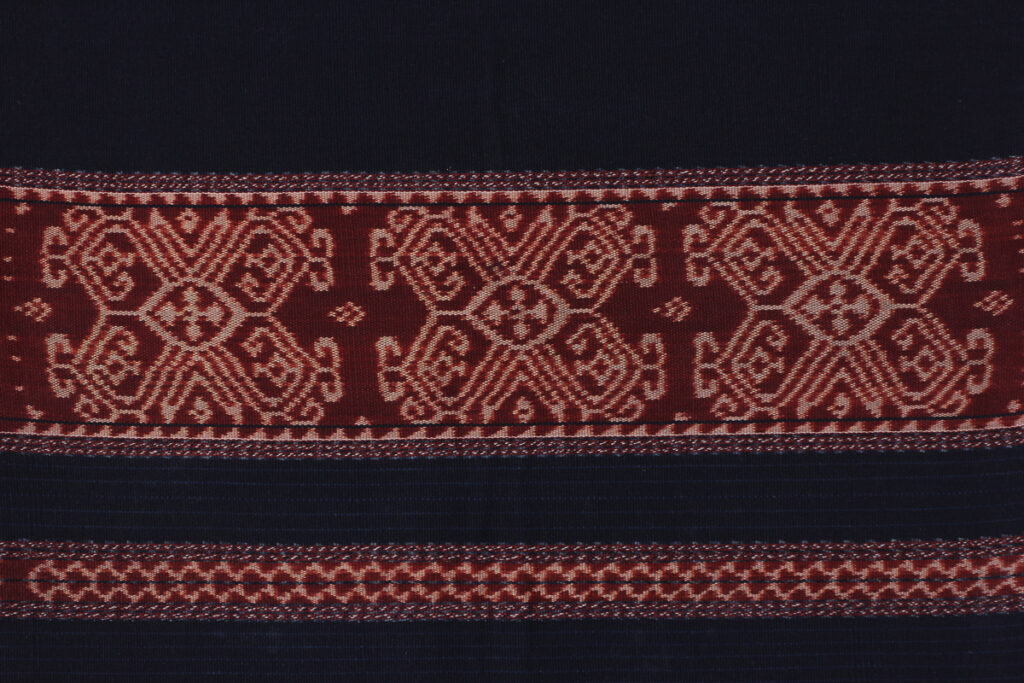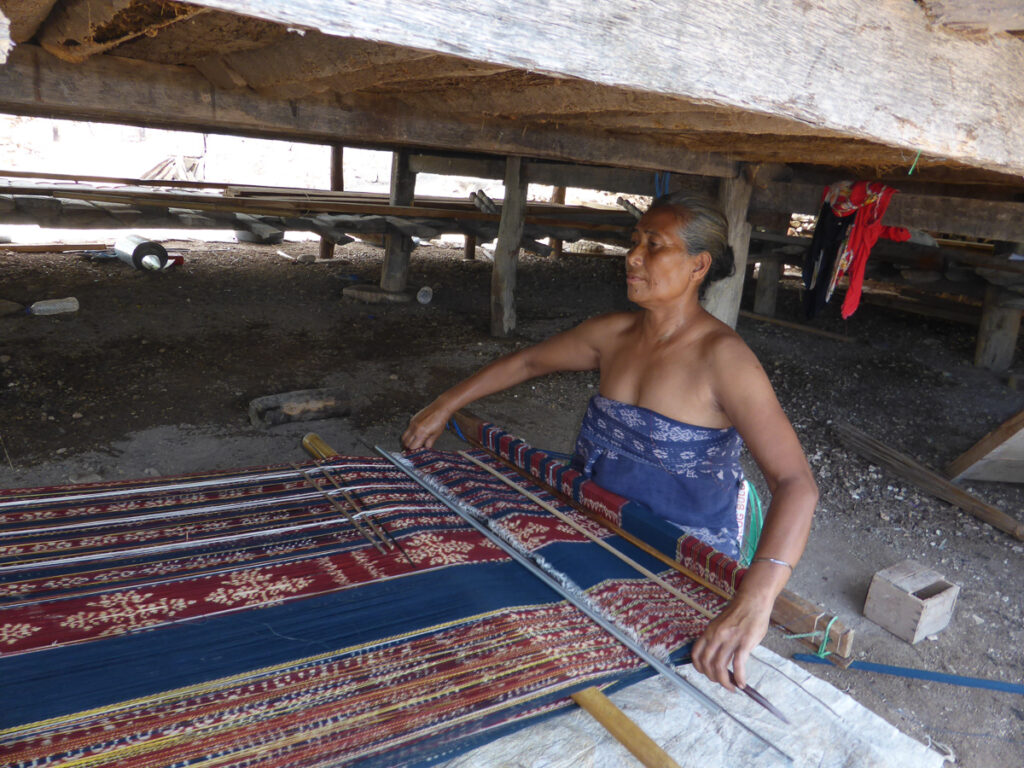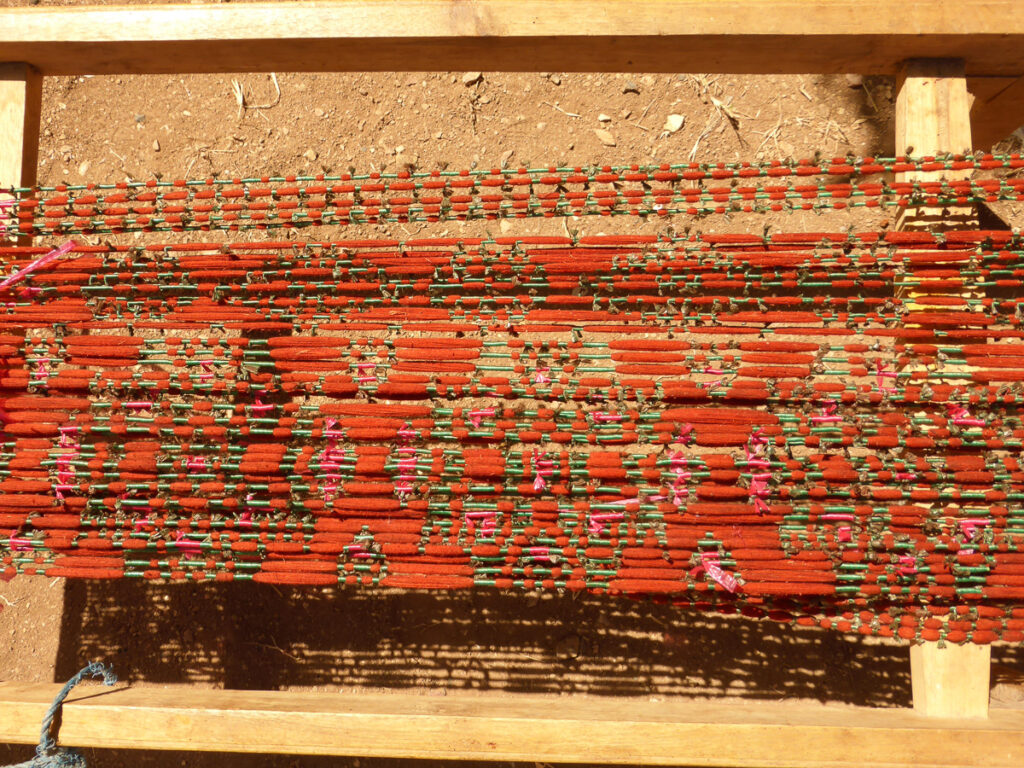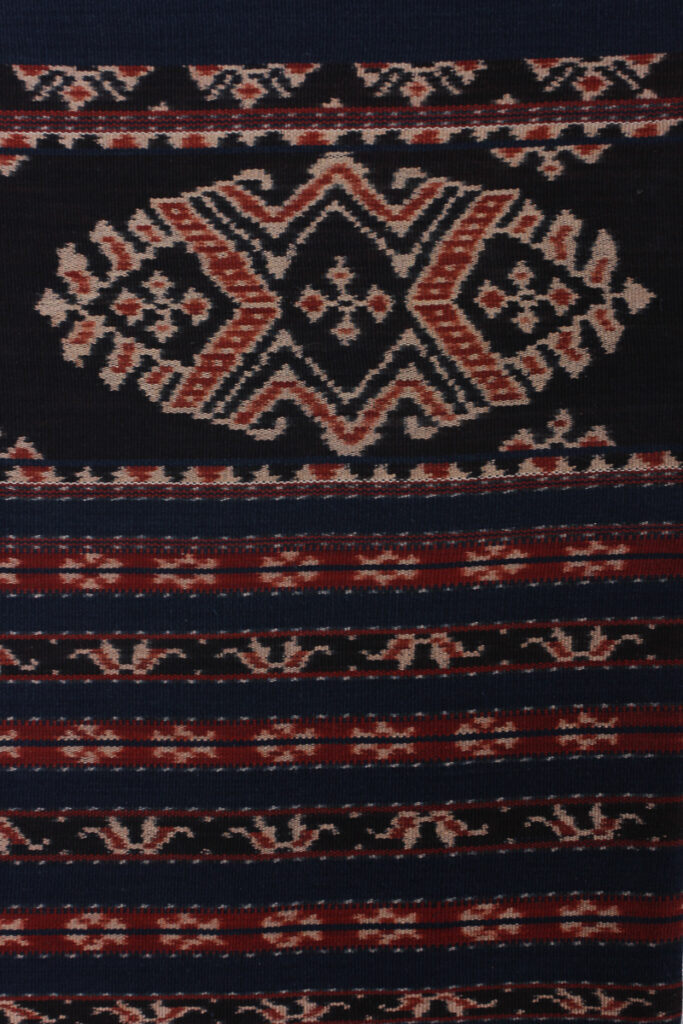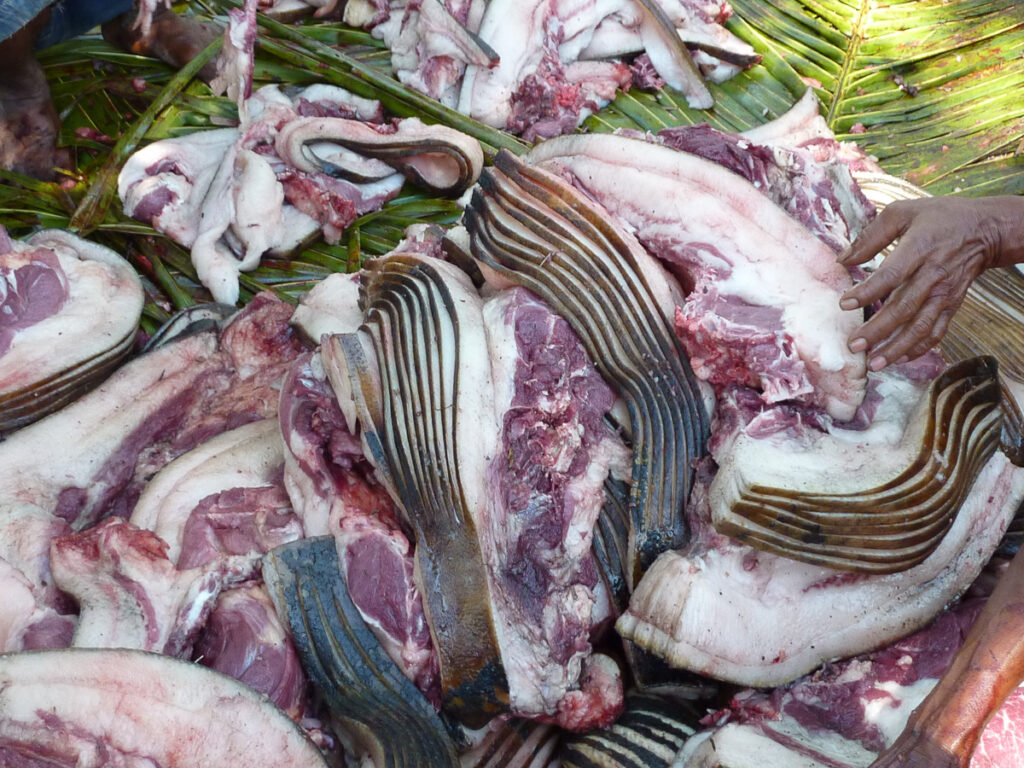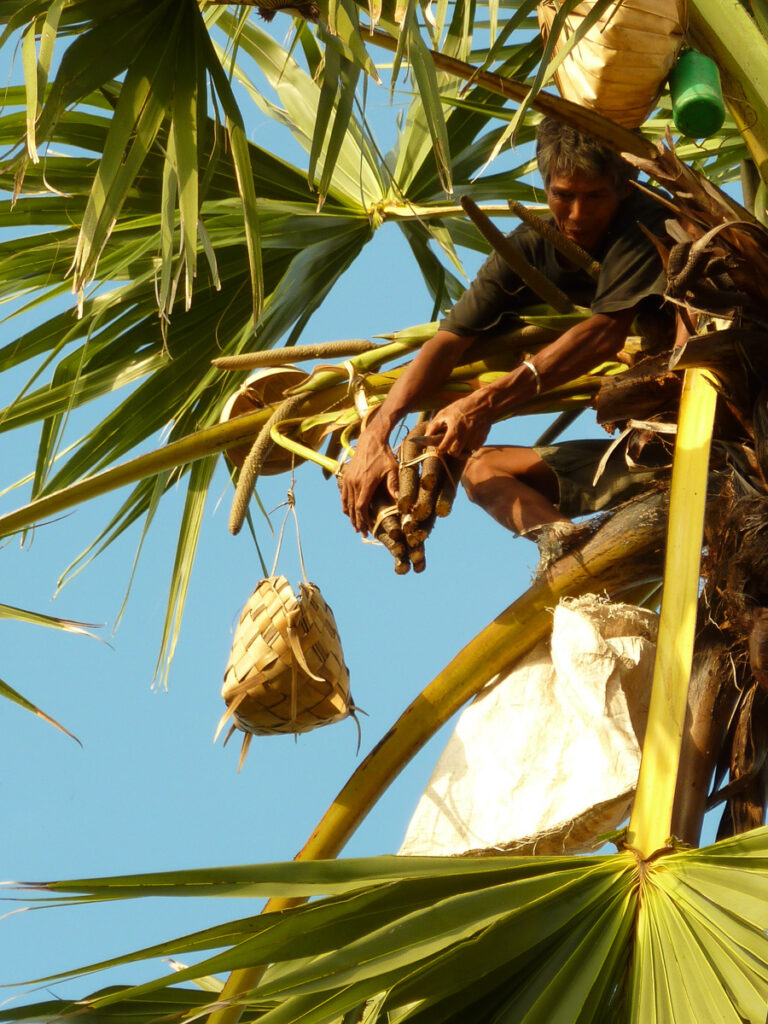
Primary motif of the Greater Blossom group
Geneviève Duggan and Icesarlince Tededara write about a matrilineal culture, where women wear their history. The challenges of COVID-19 contained the gift of time, thanks to the Tewuni rai Foundation.
(A message to the reader.)
On the small and isolated island of Savu in the Lesser Sundas of eastern Indonesia, there is a group of women whose aim is to keep alive the knowledge and the techniques inherited from their female ancestors. This exclusive female activity has its origin in a myth. At its very beginning, the society was divided into two maternal lines derived from two sisters and called Greater Blossoms and Lesser Blossoms, images referring to the flowers of the palm tree. In the course of time, each line formed sub-groups, wini, the seeds symbolizing fertility and reproduction. Each sub-group or lineage has its specific motifs.
- Master weaver Lena Jami sarong with motif kobe molai
- 1 primary motif of the Lesser Blossom group
- Master weaver Tade Jungi sarong with the motifs kobe morena
- Motif Kebeba Raijua , Lesser Blossom, wini Jewu
According to tradition men have to marry in the same line as their mothers, therefore women display on their sarongs large motifs identifying their maternal lines. The patterns displayed on the textiles help to trace someone’s genealogy or in other words to connect a person with his/her female ancestors. Motifs are remembered in four ways, through the name of an ancestress and through the name of the motif, through the narrative at the origin of the new motif and through a genealogy. There are genealogies of textiles as there are genealogies of people; both can cover tens of generations.
In a society with no written traditions, patterns displayed on textiles transmit knowledge orally and visually. In this way, with their beautiful sarongs, women are walking identity cards and history books. In other societies of Indonesia, like on the neighbouring island of Sumba, textiles identify groups of people following the paternal line (male clan). The weaving tradition on Savu is not only for the sake of creating beautiful hand-woven cloths to wear at ceremonies and festivals but for women to show their maternal identity.
These traditions are challenged by modern ways of life, like education, world religions and media. As younger generations started disregarding ancestral values, a foundation, Tewuni Rai or Placenta of the Earth, was created in 2006 for forty weavers to preserve the ancestral knowledge and traditional weaving techniques using the body tension loom and natural dyes.
- Master weaver Eu Dane at her loom
- Ikat process
- Motif ketu pedi Lesser Blossom, wini Jewu
This year the Tewuni rai is facing more challenges and weavers needed to adapt to new situations. The reasons for the economical struggle are three-fold. Firstly the rainy season mostly failed for the second year in a row. Secondly, the African swine flu which has been roaming in Asia hit Savu at the beginning of the year. Thirdly the COVID-19 pandemic resulted in a string of restrictions impacting everyday life although no cases have been reported on the island. The pandemic changed life in Savu as for more than a month no passengers’ ferries were allowed to dock at Savu, thus impairing people’s activities and schedules. Product scarcity drove prices up.
- Fetching water
- Sacrificial meat at ceremony. After offering the meat to the ancestors it is divided among those present who also take some home. Such events are the only occasions to consume the meat of larger animals.
- Harvesting the sap of the lontar palm tree
Usually, weddings and funerals see many people from the same maternal line gathering as it is believed that after death someone rejoins with the ancestors of his/ her mother’s line. A number of animals are killed for the occasion. But from March to June no weddings were allowed and very few people were allowed to attend funerals. Traditionally pigs play an important role at rituals and ceremonies as they symbolise wealth and prosperity and their fat is considered the preferred offering to ancestors. For major life crisis ceremonies, people must sacrifice pigs. Swine flu and COVID-19 disturbed this social harmony, disrupting the tradition of distribution and redistribution, of receiving and giving back as many farmers lost their pigs.
The severe drought too upset everyday life. This year the yields of sorghum and mung beans are low and there is no rice harvest at all. Indigo plants too did not grow well and the usually rich blue dye is of lower quality. The roots of the morinda tree are not robust, which affects the quality of the red dye and consequently the value of the hand-woven cloth.
Weavers of Tewuni rai are also agriculturists. During the rainy season, they help their husbands planting, and harvesting crops. During the nine months of the dry season, they have two major activities: weaving and cooking the sap of the lontar palm tree into a syrup. This year many palm trees gave only a little sap or no sap at all.
Consequently, women who used to cook the sap daily into a syrup suddenly have a lot of free time as they no longer need to gather wood and to stand at the cooking place for hours to overlook the process.
In a twist of fate, pandemic and drought brought new opportunities. Women have more time for weaving and men, who no longer climb the lontar palm tree, start to help them with various steps from winding yarns into balls and ikating motifs. Some even sit at the loom and weave. Even if households can produce more cloth, the price for raw materials increased as inter-island trade too has been disrupted. Procuring cotton yarns and artificial raffia for ikating motifs has become a challenge and carries a higher cost.
As there are no longer exhibitions and no tourists are visiting Savu, the “Meet the Makers” initiative to create a website helping weavers to reach out to a market to sell their work is more than welcome to the Savunese. Also, Tewuni rai weavers hope to establish contacts with potential sponsors. The question is whether this year new challenges will jeopardise the traditional weaving activities, which have been so far in the hands of women.
This was written with Ice Tede Dara who provided information on the dramatic situation in 2020.
Authors
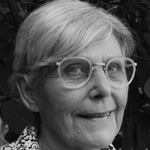 Geneviève Duggan (PhD) is a French anthropologist living in Singapore. Thirty years ago she visited the island of Savu in the Lesser Sundas of Indonesia for the first time and became fascinated by the essential role played by the maternal lines in Savu society throughout history which is clearly visible in the weaving traditions. Her doctoral thesis received the Wang Gungwu award in Social Sciences/ Humanities and the Ananda Raja prize of the Department of Sociology/ Anthropology of the National University of Singapore in 2009. Her latest publication, Savu. History and oral tradition is co-authored with Prof. Hans Hägerdal (2018 NUS Press). She is currently looking for sponsors to build a community house for the weavers of the Tewuni rai Foundation and to provide them with sewing machines so that the women can acquire sewing skills and increase their income.
Geneviève Duggan (PhD) is a French anthropologist living in Singapore. Thirty years ago she visited the island of Savu in the Lesser Sundas of Indonesia for the first time and became fascinated by the essential role played by the maternal lines in Savu society throughout history which is clearly visible in the weaving traditions. Her doctoral thesis received the Wang Gungwu award in Social Sciences/ Humanities and the Ananda Raja prize of the Department of Sociology/ Anthropology of the National University of Singapore in 2009. Her latest publication, Savu. History and oral tradition is co-authored with Prof. Hans Hägerdal (2018 NUS Press). She is currently looking for sponsors to build a community house for the weavers of the Tewuni rai Foundation and to provide them with sewing machines so that the women can acquire sewing skills and increase their income.
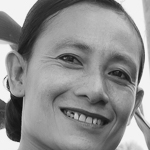 Ice Tede Dara graduated in accounting and economics at the University Nusa Cendana in Kupang (NTT) in 2013. She is a secondary school teacher in the village of Pedèro on the island of Savu and mother of two sons and a daughter, but still finds time to weave and perform the natural dyes. Convinced of the importance of keeping ancestral knowledge and weaving traditions alive, she is the most active member of the Foundation Tewuni rai where she also accepts the task of secretary and accountant. She hopes that the new website created by Meet the Makers in Jakarta will help her community to reach out to people around the world and help them sell their hand-woven textiles.
Ice Tede Dara graduated in accounting and economics at the University Nusa Cendana in Kupang (NTT) in 2013. She is a secondary school teacher in the village of Pedèro on the island of Savu and mother of two sons and a daughter, but still finds time to weave and perform the natural dyes. Convinced of the importance of keeping ancestral knowledge and weaving traditions alive, she is the most active member of the Foundation Tewuni rai where she also accepts the task of secretary and accountant. She hopes that the new website created by Meet the Makers in Jakarta will help her community to reach out to people around the world and help them sell their hand-woven textiles.
Meet the Makers
Meet the Makers Indonesia (MTM) is a collective of artisans, artists, culture advocates with a desire to support, promote and nurture Indonesian handmade craft traditions. MTM is often associated with its landmark craft show held annually in Jakarta with the intent of bringing Indonesia’s rich cultural heritage to a wider audience, in intimate settings where artisans and consumers can meet directly, share views, products, traditions and aspirations. Educational Forums, workshops, live demonstrations enrich the exhibition for better understanding and appreciation of local wisdom and cultural values. The MTM show in Indonesia has been held 14 times since 2004. MTM activities have also been held in Singapore, India, the Philippines and the United States.
Meet the Makers has established a dynamic network of artisans across the Indonesian archipelago from Sumatra to Nusa Tenggara Timur. Though these artisans have local markets and other channels where they are able to deliver their products, such channels and venues have broken down given the recent pandemic. During this time when artisan families and their economies are very much affected, Meet the Makers is implementing various initiatives to share “craft as art” forms while assisting affected artisans and their families through difficult times. MTM, in cooperation with the Indonesian Heritage Society, has run a series of paid webinars to raise funds for artisans affected by the pandemic. MTM is also currently developing a website for education and marketing purposes and is collaborating on an online auction for artisan masterpieces. Through these initiatives, MTM is responding to economic needs and aspirations of artisans in the new normal where likely purchases and educational interactions will largely be online.



